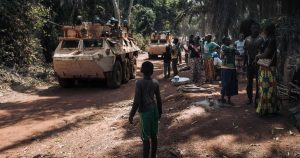The ongoing humanitarian crisis in the Central African Republic (CAR) remains one of the world’s most underreported and neglected emergencies. In 2022, CAR recorded one of the highest national crude mortality rates globally (55 deaths per 1,000 people), exceeding that of Ukraine, yet the crisis continues to receive minimal international attention. United Nations (UN) data suggest that there is no health emergency in CAR. This silence and lack of reliable information reflects a troubling pattern: the Global North’s selective visibility and response to humanitarian suffering.
An independent survey by Karume et al. (2023) found mortality rates nearly four times greater than official UN estimates, constituting a national severe health emergency. While the UN’s methodology relied on outdated data and statistical modeling, Karume’s team collected household-level data across the country, including in areas inaccessible to most aid organizations. Their findings revealed that malaria, diarrheal disease, and starvation, largely preventable conditions rooted in poverty, were the leading causes of death.
According to l’Institut Centrafricain des Statistiques et des Etudes Economiques et Sociales, approximately 70% of households in CAR live in poverty. Children under five and those in non-government-controlled (non-GC) areas are disproportionately affected. In some regions, families survive on one meal a day or less, leading to a surge in malnutrition and infant mortality. Maternal mortality (835 deaths per 100,000 live births) and the under-five mortality rate (116 per 1,000 live births) are among the highest in the world.
The burden of infectious disease has intensified due to the consequences of ongoing conflict, including displacement, overcrowding, and the collapse of water, sanitation, and hygiene systems. Decades of armed conflict, exacerbated by illicit diamond and gold mining and foreign military involvement, have deepened humanitarian needs while eroding state capacity.
A pervasive climate of impunity in CAR enables human rights abuses, often by state-linked militias or mercenaries affiliated with the Russian state-funded private military company Wagner, to go unchallenged. International institutions, including the UN, remain reluctant to acknowledge the full scale of the crisis, particularly when doing so might implicate their own policies or those of allied governments.
Dramatic increases in food aid, medical support, and public health funding are urgently needed to prevent further loss of life, especially in rural and non-GC areas. The international community must formally recognize the situation in CAR as a humanitarian emergency to mobilize aid at scale. Crises should be recognized and prioritized based on human suffering, not on geopolitical visibility or strategic relevance. The true measure of our global response must be humanity itself.
Image: Alexis Huguet/AFP via Getty Images
References
Central African Republic | Country Page | World | Human Rights Watch
How the World’s Deadliest Crises Go Unseen
What’s happening in the Central African Republic? | NRC
Central African Republic | UNEP – UN Environment Programme
UN report reveals brutal attacks targeting Muslims, refugees in Central African Republic | UN News
Clade I Monkeypox Outbreak Originating in Central Africa
Centrafrique: 70% des ménages vivent dans la pauvreté, selon une étude
Centrafrique: les autorités appellent à la vigilance suite à des cas de fièvre de la vallée du Rift
Central African Republic Overview: Development news, research, data | World Bank
